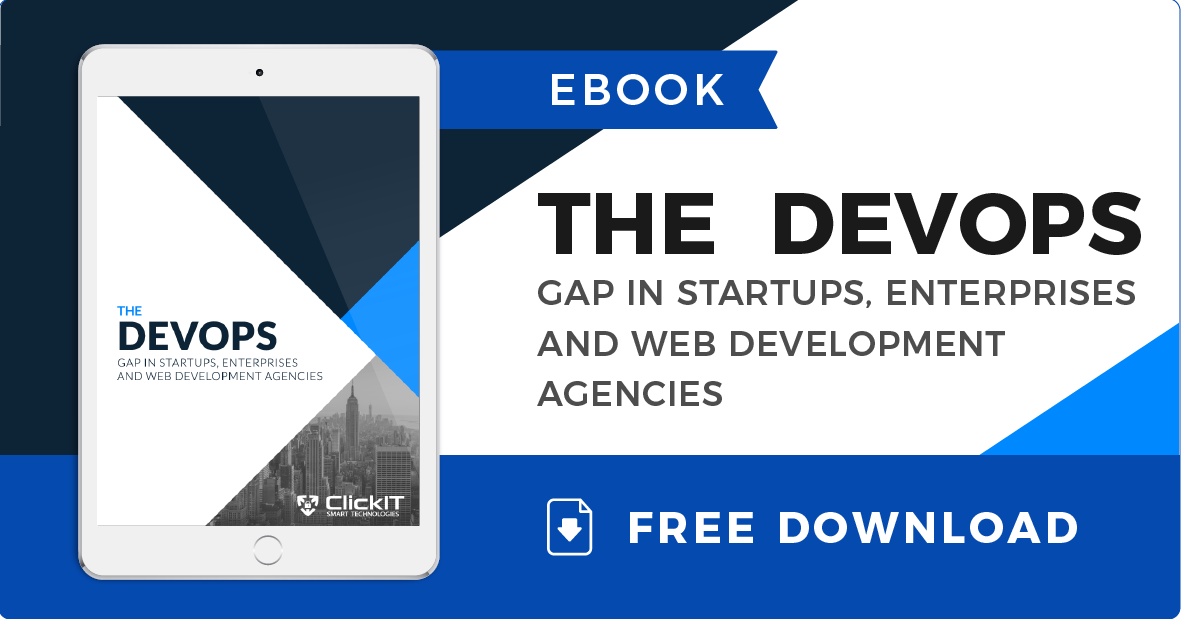DevOps is leading your company to efficiency. DevOps is a top-trending methodology/philosophy nowadays, and many business owners strive to include it in their development, service, and management processes. Despite this, few of them know the real DevOps advantages not only at a technical level but also in general business activity; in the present article, we will explain some of those business-level advantages.
Download our free ebook, “Bridge your company’s gap with DevOps,” for more DevOps insights.
Table of contents
- What are the DevOps advantages in overall business operations?
- How can DevOps advantages help my business to expand and increase earnings?
- Who should be interested in getting the best from DevOps advantages?
- DevOps Advantages Trends
- Conclusion
- FAQs
With DevOps, you can automate your application and business processes to decrease time to market, increase efficiency and reduce your IT costs.
What are the advantages of DevOps in overall business operations?
DevOps Advantage 1: It involves multidisciplinary teams. DevOps is based on collaboration.
Development, System Administration, Quality Assurance, and Management members work together, either under the same roof or separately, saving valuable time for feedback analysis and troubleshooting.
Some of the most frequent problems when working with an offshore team are obtaining the results by the next day through a different time zone. Depending on your needs, there are different ways to outsource a DevOps team, whether offshore or nearshore/onshore.
Constant communication about progress and results among team members and customers is also a fundamental principle of DevOps methodology. This communication generates a work environment in which everyone is always informed about issues, solutions, and improvement opportunities in all areas inside the team; all of this enables the team to be more responsive and capable in case of any problem.
Our experience tells you:
Encourage collaboration among multidisciplinary teams by establishing shared goals and clearly communicating the collective mission, emphasizing the importance of breaking down silos and working together towards common outcomes. Implement regular cross-functional meetings and collaborative tools to strengthen team synergy further.
DevOps Advantage 2: It provides agility to overall business deliveries.
Since DevOps is based on iterative and continuous deliveries, it significantly helps fulfill customers’ most critical requirements according to priorities; at the same time, it allows the customer to provide the proper feedback for each delivery faster and more precisely for all teams. This way, customers will feel really at ease and satisfied with their particular requirements for each delivery.
Our experience tells you:
Implement DevOps along with Agile methodologies for your projects, just like SCRUM and KANBAN, which are based on iterative releases, testing, and deployment; they provide a great way to keep delivering new features for your customers and satisfy them.
DevOps Advantage 3: Continuous improvement is the core.
When working on DevOps, teams always look for processes, tools, workflows, etc., that can be improved to achieve better and faster deliveries. This generates a positive culture in which there’s always something inside the current methodology that can be improved or enhanced to achieve customer satisfaction.
Our experience tells you:
Each 3-4 months, organize meetings with your team to discuss failures, experiences, successes, etc. from your projects. Identify your weak spots and prepare Improvement Plans accordingly. This will create a work environment focused on continuous improvement in all areas.
DevOps Advantage 4: DevOps is focused on goals and not on processes.
When working over DevOps approaches, teams are interested in satisfying customer needs in the best way possible. At the same time, they adapt to customers’ particular processes and methodologies, allowing teams to be more responsive to overall changes in the work environment and customers to be more confident in activities.
Our experience tells you:
Make your internal processes dynamic and open to change. Adapt your processes to your customers’ and create an organizational culture based on customer satisfaction and not on processes that may be hard to follow. Your customer will value this and will make your team more responsive and prepared for changing work environments.
How can DevOps advantages help my business to expand and increase earnings?
Continuous Integration and Delivery = Faster feature or functionality release = Faster earnings
Our recommended tool is Jenkins since it offers a simple integration of your approaches and a wide variety of plugins, such as Slack monitoring, GitHub integration, etc., making your work much easier.
Check out a full list of CI/CD tools to improve your workflow.
Highly available applications or websites = Permanent presence/influence on the internet = More business opportunities
For your stack, we recommend Docker + AWS ECR + AWS ECS because it offers you the possibility to easily create, launch, and manage containers, compared to other providers, as well as the possibility to increase the automation level of container launching and destroying by using another AWS solutions like Fargate and CloudFormation.
Automated IaaS = Permanent application/website capacity to attend demand = Customer confidence in your business
Terraform is a great tool for this since it offers a lot of portability, allowing you to adapt it on AWS, MS Azure, Google Cloud, and more cloud providers using the same language.
Check out the comparison between AWS vs Azure vs GCP here.
Constant monitoring on development /integration /building /testing /deploying /operation processes = Better capacity to attend to emergencies = Lower risk for losing business or customers
New Relic offers you the possibility to keep a full vision of the most time-consuming application processes, transactions, status on external services, and database monitoring, among other big variety of services that will ensure you are always aware of your app’s performance at all times.

Who should be interested in getting the best from DevOps advantages?
- C-level executives looking for better ways to run their digital businesses and are interested in being on top of digital trends.
- Startups that want to expand their presence in the internet market quickly.
- Digital businesses who want to modernize their current processes and stay up to date on customer growing demands.
- Digital businesses require high availability, high response capacity for emergencies, and a constant need to increase their cloud resources according to their customers’ variable needs.
- DevOps agencies and digital businesses with a low tolerance for failure and risk in their online businesses.
- DevOps agencies who are constantly releasing new features on their online applications/websites for their customers.
- DevOps agencies focused on saving costs from their development/integration/deployment processes.
DevOps Advantages Trends
1. Serverless approach
This is not a new concept in IT, but it has recently expanded its presence on digital companies’ plans given that it removes the necessity of having a full-time system administrator looking for all processes inside server infrastructure, and therefore, it allows businesses to save costs on human resources and save valuable effort.
ClickIT’s recommended tool is: AWS API GATEWAY & AWS Lambda.
2. Define and keep full track of Key Performance Indicators
An essential part of opting for new approaches in your business is to measure the results and improvements they have brought after implementation; businesses can keep effective track of this by defining precise Key Performance Indicators that give full vision over DevOps benefits for Directors and Managers.
QUICK TIP:
Always constantly monitor over response time, average real delivery time, delivery time deviations, time due to rework, and time/costs lost on projects, among the other Key Performance Indicators you consider valuable for your company. This can be done by keeping simple daily registers made by every manager on projects; your management team can share these results at weekly meetings, where you can identify your weak spots and process gaps to determine the corrective actions for them.
Learn more about DevOps metrics and KPIs by reading the full blog about it.
3. Microservices architecture
The best practices of Microservices allow digital companies to provide high availability and stability to their applications. This is because all the parts of applications (database, backend, frontend, etc.) are independent, and if one of those fails, it doesn’t imply that the whole app goes down; instead, the other parts will continue working while the affected component is restored. High availability means continuous presence on the market and more profits, both of the core elements for small business packaging ideas.
ClickIT recommends the following tool: Docker + AWS ECR + ECS. With this tool, you can separate every app’s component, such as the front end, back end, session management, etc., into containers to create a microservices approach for your application and ensure its high availability.
Check out the full list of DevOps Trends here.
Devops Advantages Conclusion
After learning some DevOps advantages that you can get to improve your internal technical processes and increase customer satisfaction and profits, perhaps you are wondering: Where should I start? What should I do first? If this is your particular case, then you should contact us; our team at ClickIT have significant experience in generating the best DevOps strategies for customers worldwide, and we will surely help you enlighten your path toward DevOps.

FAQs
DevOps is a cultural and collaborative approach to software development and IT operations. It aims to break down silos between development and operations teams, fostering communication, automation, and continuous feedback. Unlike traditional practices, DevOps emphasizes collaboration throughout the entire software development lifecycle, leading to faster and more reliable releases.
DevOps streamlines the software delivery pipeline by automating manual processes, such as testing, deployment, and infrastructure provisioning. Automation reduces the likelihood of errors and accelerates the release cycle. Continuous Integration (CI) and Continuous Deployment (CD) practices, integral to DevOps, enable teams to deliver features and updates more frequently, enhancing overall software quality and responsiveness.
Implementing DevOps brings several advantages, including increased collaboration, faster time-to-market, improved efficiency, and enhanced scalability. By fostering a culture of collaboration and automation, DevOps minimizes bottlenecks, reduces manual errors, and allows teams to respond quickly to changing requirements.








